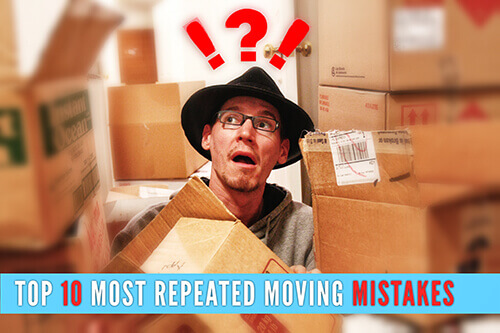 The moving season is already here.
The moving season is already here.
If you are reading this article, the chances are that your turn to move to a new place has come and you’re already getting ready for the upcoming change. If that’s the case, then the last thing you would want to do is to allow any big mistakes to slip unnoticed in your preparations.
No person is insured against blunders now and then. Life is about making mistakes and learning from them. This is why knowing the usual mistakes when relocating in advance will make all the difference in the world for you on moving day.
If this is not your first moving experience, then probably you have already made the most common moving mistakes that brought you so many troubles, broken nerves and wasted time. The real problem, though, is that most of the people do not realize what they actually did wrong and how the things messed up.
To make things easier for all of you, we have summarized the top 10 most repeated moving mistakes and shared some great tips on how to successfully avoid them:
- Failed to organize your move
Remember that being properly organized for your imminent relocation is the master key for success in those transitional times.
Start by creating your own moving checklist with all the things you need to see through before the arrival of moving day. Make sure you do this well in advance so that you have ample time to complete each task on the list: ask for in-house moving estimates, compare relocation prices, select a reputable mover, get packing supplies if you’re packing by yourself (good boxes of assorted sizes, plenty of bubble wrap and wrapping paper, packing tape, a pair of scissors, etc.), make an inventory of your entire house to decide what you’re moving with you and what you’re leaving behind, mark each packed box, prepare a survival kit, clean your house, disconnect utilities, prepare change-of-address notifications and so on.
Have in mind that general moving checklists may be helpful, but in the end you’ll need to come up with a customized version that will work specifically for you.

Be extra cautious whenever you are about to lay your signature on an official document and always refuse to sign incomplete or blank documents.
- Failed to understand moving paperwork
You must read and understand any paperwork your moving company presents to you. If there are any specific clauses you fail to comprehend, don’t hesitate to ask your mover for clarification. Be extra cautious whenever you’re about to place your signature on a piece of document. Furthermore, refuse to sign incomplete or blank documents.
You mover is required by law to give you a free copy of the booklet “Your Rights And Responsibilities When You Move” which has been prepared by the Federal Motor Carrier Safety Administration. The booklet provides thorough information about how to interpret the terms and conditions of the moving contract (Bill of Lading) and what to do if there are any problems.
- You didn’t get an estimate of the moving costs
It’s all about the price of the upcoming move, isn’t it? The thought about how much you’ll end up paying for your relocation has probably occupied your mind and won’t let you relax for a minute. Wouldn’t it be nice if you knew how much money you’re going to pay before the move? Of course it would. In fact, it is very doable and you are strongly advised to take advantage of that option.
Most moving companies offer the service of sending a representative of theirs to your house to perform an on-site written estimate of the moving costs. Moving estimates can be non-binding (a general idea of what the final price will be) and binding (a much more precise estimation of the final moving costs). Moving experts agree that not only should you go for the binding estimate, but you should also do the smart thing and request at least three such estimates from different movers. Compare the proposed prices carefully, eliminate any suspiciously low estimates (might be a sign of a potential moving scam) and you should be safe. One less thing to worry about, right?
- Forgot to explore your insurance options
Understanding your insurance options when moving is very important. Moving companies offer basic limited liability free of charge but you should know that its protection is minimal – no more than 60 cents per pound per item. This option may be suitable for you if you have very few or no valuable items in your household. However, if you’re about to move expensive household goods or ones of sentimental value, then you’re strongly advised to purchase Full Value Protection (FVP) either through your selected mover or directly from an insurance company. Under FVP, your moving company will be liable for the replacement value of each damaged or missing item during transportation.
- You didn’t declutter the house
It’s essential to carefully go through all your personal belongings before moving to your hew home and decide what items you’re definitely taking with you and what items you’re leaving behind. Why? More stuff to pack, box and relocate means more time and money. It’s as simple as that.
This is a great opportunity to get rid of the things you won’t be needing anymore. The usual decluttering tip states that if you haven’t used an item in over 12 months, the chances are that you’ll never use it. However practical this piece of advice may sound, it may not actually work in your case. Nevertheless, it’s high time you did something about that pair of shoes you bought 4 years ago and never wore. Or the numerous broken toys which your child surely won’t play with anymore.
The good news is that you have good options here. Some items can be given to family members, friends, neighbors or coworkers, others can be donated to charitable organizations and certain totally useless goods can just be thrown away. Why not organize a garage sale a few weeks before moving day and thus cut down on the moving expenses?
- Failed to prepare a survival kit
A survival kit is nothing but a box (or two) with absolute essentials which you will need during your last day at your old home or during the first night (or day) at your new place. Such survival kits (aka “open first” boxes) should contain helpful items to provide basic meals, produce an extra set of clothes for the entire family or handle minor emergencies.
Here’s what to consider packing inside: prescription medication, bottled water, non-perishable food, paper plates, plastic utensils, towels, sheets, a change of clothes for everyone, a blanket, toiletries, favorite games of kids and/or pets and some essential tools.

Your most valuable items must stay with you before, during and after the move. Remember that and always obey this simple rule of thumb.
- Handed valuables to mover
Your most valuable items must stay with you before, during and after the move. Period. Entrusting them to your moving company is never a good idea. Such items of extraordinary value may include but are not necessarily limited to: debit/credit cards, cash, jewelry, expensive electronic equipment, very important documents (passports, driver licenses, deeds, certificates, product warranties, tickets, etc.).
If you’re unable to take any of these valuables with you for some reason, then ship them to your new destination via specialized courier services, such as UPS, FedEx, DHL and so on.
- Failed to recognize your pets’ needs
Your pets are not allowed to be relocated inside the trailer of a moving truck. The reason behind that prohibition is that the interior temperature can easily reach extreme values, and thus your pets’ life will be seriously endangered. The safe option under the circumstances is to take your loved ones with you either in your car or on the plane.
More information about how to efficiently move with your pets can be found here:
- Failed to recognize your plants’ needs
Your plants are much more fragile than your pets and will have to be meticulously prepared in order to survive the relocation ordeal.
Moving companies are forbidden to transport any plants of yours on moves longer than 150 miles. For shorter relocation trips, consult with your mover whether they will be willing to take your plants and under what conditions. If they say no, try to think of alternative ways to haul them. However, should no satisfactory option become available, then you may have to just give them away to friends, family members or neighbors, or donate them to local schools, nursing homes or hospitals.
- Hastily choosing to move by yourself
How many times have you wondered, “Why should I pay a moving company to help me relocate when I can save money by doing it myself?”
The answer to this question is never straightforward. Yes, you can choose not to employ the services of a mover BUT certain conditions need to be met so that you have a trouble-free relocation experience.
First of all, you will need at least two (the more the better) tireless helpers to aid you during packing, moving household items to the hired truck, loading and then unloading, moving the same household items into the new home, and unpacking. Secondly, you’ll need to rent moving equipment and a truck. And thirdly, and most importantly, none of your personal possessions will be insured in any way so if anything bad happens to them during packing, transportation or unpacking, then you’ll have no one to blame but yourself.
Now think about it in terms of time. How much time would it take you to relocate your entire house and how much time would it take an experienced moving crew to do the same job? Would the entire moving process be justified if you saved some money by losing too much time?
Nobody knows the answers to these questions better than you. Just think about it really well and if you feel confident that you can do it without the help of a moving company, then go for it. But if you feel hesitant or nervous about it, then asking for professional help is easier than you might think.

